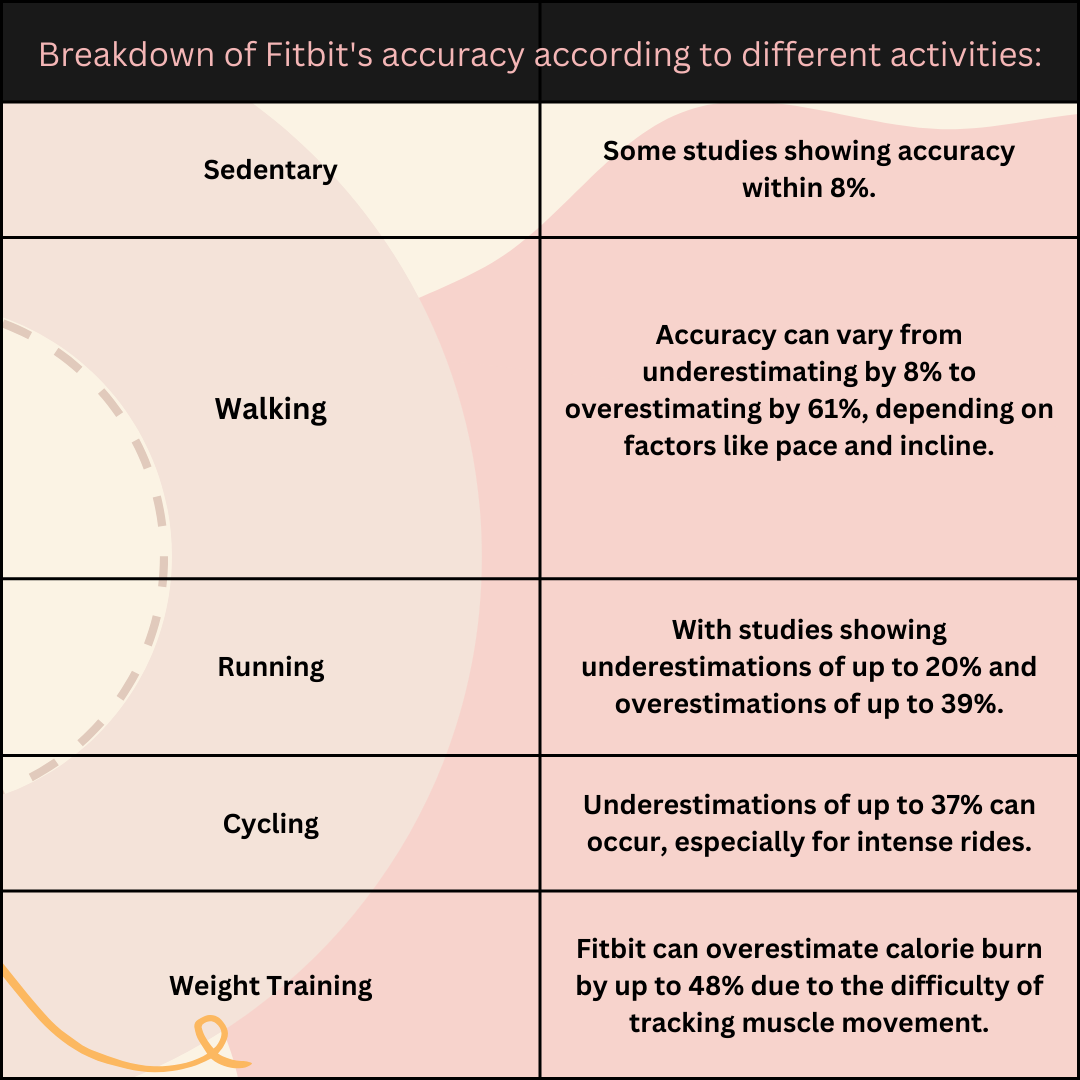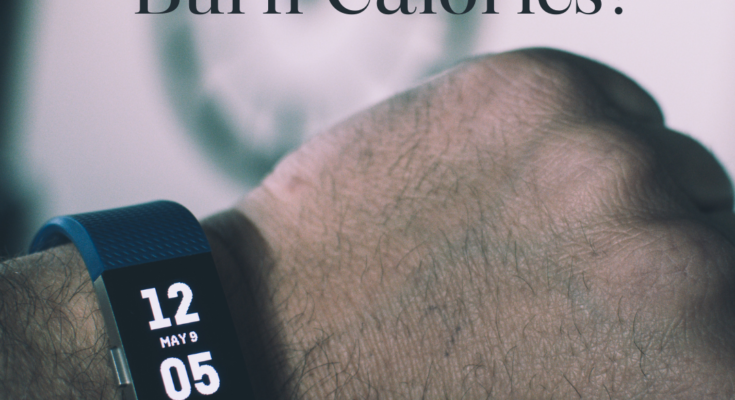Are you curious about the clarity of how accurate Fitbit calorie burn is? While the accuracy varies between Fitbit models, you can generally trust the numbers to support your fitness and dietary goals.
Despite a potential margin of error of 200-300 calories daily, fitness experts assure us that Fitbit remains a valuable tool for achieving the right calorie balance, whether for weight loss through a deficit or muscle building with a surplus.
However, Fitbit calorie burn accuracy is a nuanced topic with several factors at play, so let’s explore it together, find out about Fitbit’s calorie accuracy, and share practical tips to enhance the faith of your calorie calculations.
How accurate is Fitbit Calorie Burn?
Fitbits have become synonymous with fitness tracking, and one of their key features is calorie burn estimation. But how accurate is it? Can you rely on your Fitbit to tell you how many calories you’re torching with each step, workout, and lazy evening on the couch?
The calorie-burning of Fitbit has evolved greatly since its early days. Sure, there’s always room for improvement, but let’s credit Fitbit for being accurate.
Studies have shown that Fitbit calorie burn estimates are generally within a reasonable range, especially for basic activities like walking and running. One meta-analysis found an average correlation 0.64 between Fitbit estimations and actual calorie expenditure. That means while not perfect, the numbers aren’t wildly off either.
Fitbit goes beyond counting steps, and one of its star features is the calorie burn counter. Have you ever wondered how Fitbit works its magic to calculate those burned calories?
Well, the secret sauce lies in a couple of key ingredients. First up, your heart rate takes center stage in this fitness calculation. But that’s not all – Fitbit also considers your height, weight, age, and gender to serve up a calorie count that’s tailor-made for you.
Note: Fitbit charge 5 is highly recommended in order to track accurate calories burned.
Factors that are effecting Fitbit Calorie Burn

Fitbit calculates calorie burn using a sophisticated algorithm that takes various factors into account. The device uses these data points to estimate the number of calories burned throughout the day.
| Basal Metabolic Rate (BMR) | Represents the number of calories your body needs at rest to maintain essential physiological functions. While Fitbit’s BMR calculation follows established formulas, individual variations will affect the overall accuracy. Fitbit taps into your height, weight, age, and gender to whip up an estimate about you. |
| Activity Level | Fitbit tracks your movements throughout the day, including steps taken, distance covered, and floors climbed. This information and your BMR contribute to the overall estimation of calories burned. |
| Heart Rate | Fitbit gets its detective mode on with sensors that track your heart rate during workouts. Using heart rate data to determine your activity intensity allows for a more accurate energy calculation. |
| Skin Temperature (Certain Models) | As skin temperature changes, Fitbit models refine calorie burn estimates, providing additional information for more accurate calculations. |
While Fitbit’s calorie burn tracking is generally reliable, certain factors can influence its accuracy
| Individual Variations | Fitbit’s algorithm may need to model each individual’s physiology correctly due to its generalized formulas. Age, gender, and body composition are all factors that can create variation. |
| Intensity of Activities | Fitbit is especially good at recording more conventional activities such as walking or running, though accuracy will be slightly lower for non-conventional moves or resistance workouts. However, the device could better measure energy burned in activities that don’t depend on step count or heart rate. |
TIP: Combine with other metrics: Use your Fitbit alongside a heart rate monitor or GPS watch for a more comprehensive picture of your workout.
Can Fitbit Accurately Track Calories?
Little fitness device that’s been all the rage in recent years, all thanks to smart watches for being reliable fitness tracker and tracking one of the fitness metrics that has eluded consumer capabilities until now is arguably the most appealing feature and that ofcourse tracking your calories burned.
Did you know? the research-grade methods of tracking calories involves equipping a Co2 respirator or confining people in melancholic metabolic chambers that measures every breath you take however they are subject to some degrees of error
We’ll get into the nitty-gritty of Fitbit’s calorie counting game and why it might not be perfect all of the time:
- Heart Rate Variability: Everyone’s heart does its move, and Fitbit tries its best to keep up. But it might need help to nail down the exact beat for some people. When the heart rate reading isn’t spot-on, the calorie count might detour into the land of inaccuracy.
- Wrist Placement: Fitbit has a preferred wrist – the non-dominant one. If it’s not hanging out in the right spot (about two to three fingers from your wrist bone, to be precise), it might not accurately catch your heart rate vibes. And when that happens, the calorie burn estimate might play a game of hide and seek.
- Activity Intensity: Fitbit can be dramatic, especially during high-intensity scenes. More intense activities trigger an overestimation of your energy, depending on where your Fitbit is chilling. On the flip side, low-key activities like a leisurely walk might throw off the calorie burn estimate. According to a Journal of Personal Medicine study, fitness trackers struggle the most when keeping tabs on their strolls.
- Overall Activity Level: Fitbit loves a good sweat session, but it’s most on point when you regularly rocking moderate to vigorous activity vibes. If you’re a fitness freak, it might give you too much credit. Conversely, Fitbit might underestimate the calorie burn if Netflix is your preferred workout.
- Weight: Fitbit relies on your weight to work its calorie magic. But here’s the catch – it’s most accurate within a specific weight range. Stray too far, and the estimate might lose some sparkle.
Remember that while Fitbit is a superhero in the fitness tracking world, it’s not immune to a few plot twists. Adjusting your wrist bling, being mindful of your heart’s rhythm, and understanding its quirks can help you maximize your Fitbit’s calorie wisdom. Time to step, sway, and stay in sync with your fitness companion!
Bonus Tip: If you’re really concerned about accuracy, consider consulting a professional for a metabolic test. This can provide a more precise baseline for your calorie expenditure.
How to Improve the Accuracy of the Fitbit Calorie Burn
To make the most of Fitbit’s calorie burn tracking, consider the following tips:
Personalize Your Profile: Be sure that your Fitbit profile for age, gender, height, and weight, as well as activity level, is accurate. The more accurate this data is, the better Fitbit can calculate for you. It also uses this data to provide you with more accurate sleep, activity, and heart rate data.
Wear Your Device Properly: So, wearing your Fitbit in the right way is vital. Wear it tight against your wrist, about one finger above the bone at the base of your thumb, to achieve maximum heart rate monitoring efficiency.
Calibrate Your Stride Length: If you do walking or running activities, setting your stride length makes distance calculations, and calories burned more accurate. One can achieve more accurate results by manually entering one’s stride length in the Fitbit app.
To Conclusion
To conclude, can Fitbit’s estimates be relied upon? By trying to understand how they calculate calorie burn, we can see that a dynamic relationship exists between technology and physiology and just how fallible each can be. Indeed, while Fitbit has gradually improved its algorithms, and thus its estimates are now quite good, the variables affecting its accuracy are subtle.
The accuracy of Fitbit stems in part from its expertise in monitoring daily activity, heart rate, and even skin temperature (in some models). Research also shows that, at least for simple actions such as walking and jogging, Fitbit’s estimates fall within a reasonably accurate range of calories burned.
But the road to accuracy is not without its obstacles. However, such factors as heart rate, wrist position, and activity level introduce a certain margin of error. Thus, Fitbit’s sweet spot is in moderate to vigorous activity, where its calculations genuinely excel.
Therefore, when you walk, sweat, and synchronize your Fitbit, remember that it is not just for counting calories but a companion along the way toward a healthier life. Love your numbers, the technology, and the road to fitness!
You may also like to read: Do Hot Flashes Burn Calories? Myths and the Truth





One Comment on “How accurate is Fitbit Calorie Burn”